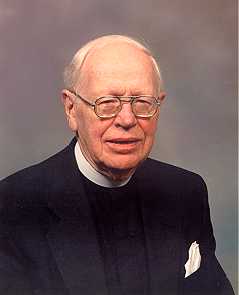By Eve Galanis
At the precipice of the modern LGBTQ+ movement, an Episcopal priest in Connecticut named Canon Clinton Jones spearheaded one of the first major LGBTQ+ advocacy organizations and mental health supports in the state. He revolutionized community care and support—inspiring generations to come.
Early Life
Clinton Jones was born in 1916 to a farming family in Brookfield, Connecticut. As a child, Jones went to St. Paul’s Episcopal Church with his mother, a church organist. Later, he attended Bard College, which according to Jones, was a “very modern, very liberal” program. After graduating, Jones attended the General Theological Seminary in New York, completing his master’s degree in divinity studies in 1941 when he was 24. By 1946, he was an ordained minister at Christ Church Cathedral in Hartford and after two years, the church appointed him as senior administrative priest, or canon.
Jones Begins LGBTQ+ Research
In the early 1960s, Jones took a special interest in homosexual research when he was appointed to the Rehabilitation Committee for the Greater Hartford Council of Churches. The Committee examined a variety of issues including treating drug addiction and transitioning people from in-patient mental health care back into public life. The Rehabilitation Committee began studying issues related to homosexuality, but Jones decided another separate committee needed to be established. This inspired the formation of the group, Project H.
Project H
In partnership with Trinity College psychology professor Dr. George Higgins and attorney Donald Cantor, Jones formed Project H in 1963. Project H provided educational and counseling services for gay people in the Christian community. The group met at the Hartford YMCA with social workers, psychologists, and clergy providing services. The origins of the name derived from the need for secrecy—YMCA administrators were concerned about how signs that said “homosexuality” would look around the building. They asked for the group to come up with a more discreet name—hence, Project H.
In 1966, Project H received complaints that the CT Department of Corrections had established a “Cell Block G” to house all gay and transgender people. Canon Clinton Jones negotiated meetings in the prison to speak with the warden. The warden claimed the separation was for the protection of the Block G inmates but Jones found that those housed in Cell Block G actually lived in worse conditions than the general prison population. They had limited access to the outdoor yard and had to eat dinner at 3:30 in the afternoon to avoid interaction with other inmates. Jones was not able to convince the prison to dismantle Cell Block G, but he was able to provide counseling to individual prisoners—a practice he continued until his retirement in 1986. Project H inspired the formation of the Kalos Society, Connecticut’s first LGBTQ+ political advocacy organization, in 1968. In 1980, as LGBTQ+ rights expanded, Project H was renamed the Committee on Sexual Minorities.
George H. Henry Foundation

George W. Henry Foundation, Literature and office material – University of Connecticut Library Archives and Special Collections
As Project H evolved, the group became aware of an organization in New York which provided similar services. In 1947, Dr. Alfred Gross founded the George H. Henry Foundation, named after the early sex researcher. The Henry Foundation was a social service group that aided LGBTQ+ people in whatever capacity they needed, such as legal aid, housing, and counseling services. Jones met with Gross and opened a Hartford chapter to expand the organization’s reach.
In a 1996 interview, Jones stated that after their meeting, the FBI approached Alfred Gross looking for information on a certain individual, but Gross did not comply. Organizers of both groups were mindful not to keep files on one another to protect the anonymity of the people they helped. As a result, Hartford Council of Churches paid for a private phone line for Jones’ office in 1966. His office also had its own private entrance so individuals could seek help without having to walk through the front and risk identification.
The XX Club
In 1971, Jones and Dr. George Higgins founded the XX Club (also known as the Twenty Club) as a support group for transgender people. This extensive group met for over 30 years at Christ Church Cathedral and provided counseling, psychiatric services, and later, gender-affirming surgery. In the 1970s, Clinton Jones founded the Gender Identity Clinic of New England—a network of social workers and counselors who provided transgender people with mental health treatment, hormone therapy, and surgery. At the time, Jones’ efforts were some of the first of its kind to advocate for trans-identity and support.
Leaving Behind a Legacy
In addition to his advocacy, counseling services, and ministry work, Jones published three books: What About Homosexuality (1972), Homosexuality and Counseling (1974), and Understanding Gay Relatives and Friends (1978). He also published numerous articles and research papers on related topics.
As Jones approached retirement, a 1983 Hartford Courant article named him “a patriarch of Hartford’s gay culture.” During his life, many people were not aware that Jones was a gay man. He lived with his partner Kenneth Woods, a church musician, in domestic partnership for 40 years. After Jones’ retirement, they moved to Manchester, Connecticut.
In 2005, The Friends of Christ Church Cathedral created the Canon Clinton R. Jones Award, honoring Jones’ 40 years of active ministry. On June 3, 2006, Jones died in his home. Despite Jones’ death preceding the legalization of gay marriage, Kenneth Woods inherited his property. During his lifetime, Canon Clinton Jones was a central figure in Connecticut’s LGBTQ+ community and a pioneer for compassionate care, queer visibility, and gender affirmation in the mid-20th century.
Eve Galanis is a historian, teacher, and artist based in Connecticut. Her research is primarily centered on historical justice and intersectional critical theory. She currently teaches history and philosophy at Classical Magnet School in Hartford.









